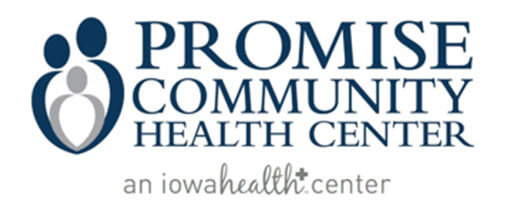
Those were the conclusions of a research project conducted by three students – Ellen Podhajsky, Amy Tuttle and Cassidy Bultena – for a social work course at Northwestern College in Orange City. The project included interviews, in Spanish, with seven patients at Promise after appointments at the health center.
Podhajsky, who graduated earlier this month with a major in Spanish, recently presented their research findings to Promise staff.
“We were very impressed with the feedback that we heard about Promise and the steps that you are taking to provide good interpretive services,” she said.
Podhajsky said it’s an important service as studies show the quality of care, as well as how patients perceive the care they receive, is directly linked to medical interpretation.
Here are highlights of the six themes that came out of the students’ interviews with patients:
Theme 1: Striving for English Proficiency
Most of the Spanish-speaking patient participants said they recognize the value of learning English, acknowledge there is an increased difficulty to communicate in a primarily English-speaking country and desire to improve their English. For those who have improved their knowledge of English, it also also has increased their comfort level in the health-care setting and has helped confirm to them the accuracy of interpretation.
One patient said: “I feel more comfortable now because, even though the interpreter is translating for me, I’m understanding at the same time.”
Theme 2: Powerlessness
The interviewed patients expressed that they have felt a sense of powerlessness during past situations when an interpreter wasn’t present. In those settings, they experienced emotions such as fear, frustration and a lack of confidence due to concerns that they are not being understood or that they do not understand.
Podhajsky cited a study that found high-quality clinical care is compromised when communication barriers exist. Therefore, professional interpreting services are an important component even if the gap can’t be completely bridged.
“Although interpreters significantly alleviate the negative feelings and sense of powerlessness associated with the language barrier, they may not be capable of eliminating them entirely,” Podhajsky said. “Some of the patients’ fears were expressed even when interpretive services were available, which shows that even the best interpretive services do not replicate shared language connections.”
Theme 3: Interpreter as Crucial Link
In interpreting situations, verbal communication travels from the medical practitioner, via the interpreter, to the patient – then back again.
Naturally, Podhajsky said the interpersonal connections between the provider and patient take the same path. Six of the seven patients spoke first of their interpreter when asked about the connections they felt with their provider.
“We found that the connection with one’s doctor depends on the confidence that they have with their interpreter,” she said. “Some indicated that they even feel a stronger connection with their interpreter because they’re the one speaking the same language as them.”
Participants expressed confidence at Promise, thanks to the skill of their interpreters. In fact, some felt equally understood by both their interpreter and provider. They feel good about asking the provider questions when they are confident everything is being interpreted correctly.
“We found that our participants had more confidence in the interpreters at Promise than indicated in all of the previous studies that we found,” Podhajsky said.
Theme 4: Quality and Uniqueness of Site
Six of the seven patients interviewed spoke about Promise’s uniqueness and good reputation in interpreting services.
The patients respect and appreciate the services. They feel comfortable with the interpreters. Some travel from other towns to the health center due to its excellent interpreting services and its experience in working with Hispanic patients.
Podhajsky noted a study that shows miscommunication about health problems and expectations occur when there are verbal and nonverbal communication barriers.
“At Promise, there were no indications of miscommunication or dissatisfaction. Nobody had any complaints about the services that they receive,” she said, noting that participants were specifically asked to share ways the health center could improve. “We didn’t hear anything.”
Theme 5: Benefits of a Professional
The patients interviewed prefer professional interpreters and recognize the advantages that professional services have. When they use a professional interpreter, they know they are getting expertise in medical language and are receiving accurate and complete explanations of what the provider is telling them. The patients also like that they don’t have to inconvenience and burden family and friends – which Podhajsky noted was the opposite of previous studies that showed some patients are concerned about burdening an interpreter.
The important role of professional interpreters is further emphasized by studies that show using family, friends and other nonprofessionals increases interpreting errors.
“Participants were appreciative of the available interpreting services at Promise,” Podhajsky said.
Theme 6: Preferences Between Consecutive and Simultaneous Interpreting
The patients interviewed were split between which type of interpreting they prefer.
Podhajsky noted one correlation: Those who prefer consecutive interpreting tend to be those who were learning English. It allows them to clearly hear both languages and gives them more assurance about accurate interpretation. Those that prefer simultaneous like the more conversational style and less waiting and delay.
Following the research project, the students were complimentary of Promise.
“Promise is providing very good services,” Podhajsky said. “We were really impressed with all of the steps that Promise takes to ensure accurate interpretations for their patients. That obviously was reflected in the feedback that we received from patients.”
WHAT CAN OTHER CLINICS LEARN?
Ellen Podhajsky closed out the presentation by sharing qualities of Promise Community Health Center’s interpreting services that other clinics can learn from:
- All interpreters must pass an exam consisting of medical terminology, interpreting ethics, the interpreter role and a mock consecutive session.
- Importance is placed on continuing education.
- Friends and family are not allowed to interpret for patients.
- Forms and medication instructions are available in Spanish.

